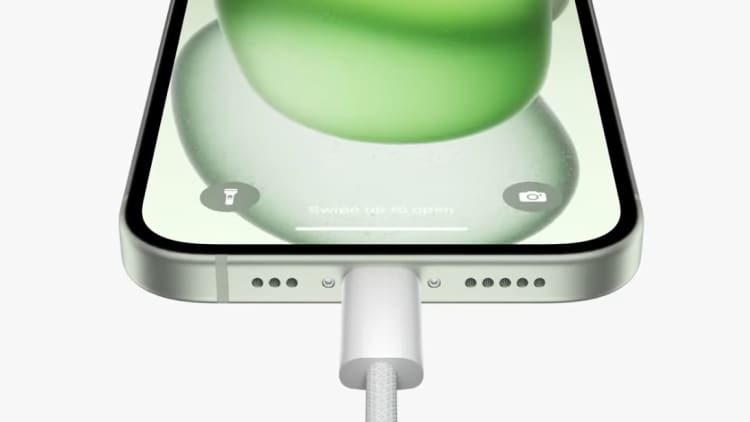Apple iPhone Pro A17 Pro chip.
Source: Apple Inc.
Apple today unveiled the new iPhone 15 to plenty of fanfare. But there’s also a big upgrade to the processor inside the 15 Pro and 15 Pro Max.
The new A17 Pro chip, designed by Apple, will have a six-core central processing unit and a six-core graphics processing unit. That’s one more GPU core than the A16 processor, which was found in last year’s iPhone 14 Pro and 14 Pro Max, and this year’s lower-end iPhone 15 and 15 Plus.
The additional GPU core will enhance graphics performance, allowing new gaming capabilities such as ray tracing. The rendering technique allows for more realistic lighting of a scene for elements like reflections and shadows.
“They spent a lot of time emphasizing the GPU and that’s very telling,” said Ben Bajarin, CEO and principal analyst of Creative Strategies. “Camera, chip, GPU, visual experience, gaming: this is the next platform that takes iPhone the next 4-5 years.”
The enhanced graphics have led some gamemakers to create iPhone-native versions of their popular titles for the first time. Ubisoft‘s upcoming Assassin’s Creed Mirage and Capcom‘s Resident Evil 4 Remake are both set to come to the iPhone 15 Pro in the next year.
Apple’s latest processors are also its first chips to be made with 3-nanometer technology. As the most advanced semiconductor node currently available, it’s a likely culprit for the new generation’s price jump.
Advanced chips at this level are almost entirely made by one company, Taiwan Semiconductor Manufacturing Company, or TSMC, and Apple is its largest customer. This has been a cause for concern amid growing concerns about China invading Taiwan.

TSMC is now building a massive $40 billion new chip manufacturing plant in Arizona, although those plans have hit delays due to a shortage of skilled semiconductor labor in the U.S. Asian-made chips were also hit hard during the years-long chip shortage that led to slowdown in production for everything from smartphones to cars.
“It’s tough because of supply constraints of 3-nanometer. It’s going to be hard to get increased capacity as demand goes up,” Bajarin said. “They’ve got enough for the Pro and ProMax for a few months.”
Bajarin said the platform shift to 3-nanometer chips is a “big step” that Apple will use to put itself into a competitive space with desktop processors like those made by Intel.
The new Apple Watch Series 9 also features new Apple silicon, in the form of a new chip Apple calls the S9 System in Package, or SiP. Apple is calling this its “most powerful watch chip yet.”
The S9 enables new features like a double-tap gesture for answering and ending calls without touching the watch, and on-device Siri to allow private logging of health data off the cloud.